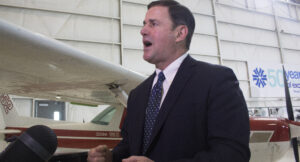Gov. Ducey visits Pima College
Story and multimedia
by JOE GIDDENS

This rhetorical device also was used by Budget Director Matthew Gress during his Budget Roadshow meeting Jan. 23 at Pima Community College’s District Office. The Aztec Press asked the governor about his use of the phrase “drier future” rather than climate change during his visit to Pima’s Aviation Technology Center on Feb. 15.
“We’ve been specifically talking about water. So when you have less water, what that means is that it will be drier,” Ducey said. “It’s also a way for us to bring the public along in terms of what we needed with the drought contingency plan.”
Ducey responded about why climate change has not been addressed.
“Because we’re trying to get something passed at the legislature and what we’re trying to get the votes and get the public to understand what’s happening,” Ducey said. “The fact that we’re actually taking more water from the Colorado River than Mother Nature puts back. That means it will be drier and we think people understand that.”
Human use and the amount of water entering the Colorado River are two major factors increasing temperatures have reduced the amount of water flowing in the system by one-third by increasing evaporation, according to the American Geophysical Union in 2017.
This continues a trend from the governor’s office to avoid stating “climate change” or anything related to temperatures with regard to the state’s water woes. Our interview recently was picked up by the Phoenix New Times with the governor’s office not offering further comment to that publication.
As reported in the previous issue, Ducey placed water as his main priority at his State of the State address. Because of a mandate from the Bureau of Reclamation that states that take water from the Colorado River must reach a compromise by Jan. 31 or the federal government would decide how water from the river would be allocated.
This is especially problematic for Arizona, because as the junior member of previous water legislation, our state would receive the first cuts.
The initial deadline was extended to March 4 because both Arizona and California have to finalize their plans. A deal between Arizona and the Gila River Native American Community has been challenging. During a roundtable Southern Arizona leaders on the Feb. 15 visit, Ducey stressed that a “rift was not going to happen,” in Arizona’s Drought Contingency Plan.
Aviation proposal
Ducey toured the Pima Community College Aviation Technology Center on Feb. 15 and met with a roundtable of local leaders throughout Southern Arizona. Elected officials and local aerospace leaders were on hand for the governor’s proposal for a one-time investment of $20 million to double the capacity of Pima’s aviation program.
If approved, it would mark the first funds from the state since austerity measures ended state funding in 2015 to Arizona’s community colleges. Ducey stated during the roundtable with local leaders and reiterated during the formal event that Pima Chancellor Lee Lambert has been instrumental in this potential change.
“I also want to say thanks so much to Lee Lambert and for his leadership of this institution and the way he’s educated, policy makers and electeds on what an investment in Pima Community College results in for the state of Arizona,” Ducey said.
The state government and Pima College are expecting big economic results from an expansion, citing a study from Sun Corridor Inc.
“… going to result in 300 new jobs created in this region, which will then have an impact on another 150 jobs in this region. … this will have a close to a $255 million dollar,” said Lambert to the crowd.
Lambert and Steve Pagnucco of Universal Avionics went before the Arizona House of Representatives Committee on Higher Education and Workforce Development on Feb. 19. Lambert views the visit as one part of a larger strategy for the college.
“Make sure we keep collaborating and deepening our relationships with the governor’s office. So that way they could see that this isn’t just an idea of one person or a small group of people. This is an idea of a whole community to meet a larger need.”
